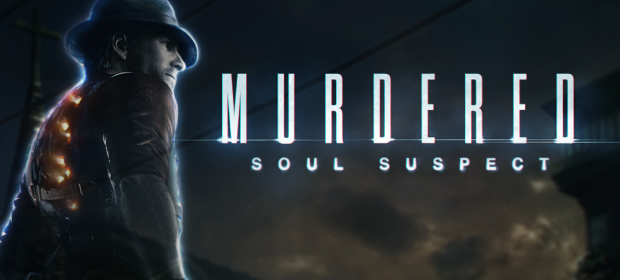If the disembodied spirits of the recently deceased could talk to us, they probably wouldn’t describe the place they’ve gone to as “fun”. I don’t necessarily expect that the realm of the dead is as scary and ominous as it’s always portrayed to be in books and movies, but I highly doubt it’s much of a social hub. In a video game, however, unfettered from the restrictive conventions of “real life”, the world of the dead should definitely be scary – and it should certainly be fun. The biggest problem with Airtight Games’ Murdered: Soul Suspect is that while it mostly nails the creepiness, it very rarely lets you enjoy yourself very much.
The story begins in Salem, Massachusetts, with the death of protagonist Ronan O’Connor, a police officer on the trail of the elusive “Bell Killer”, a psychopath with no clear modus operandi who murders victims with very few common denominators. Thrown out of a window and shot seven times in the chest, Ronan is surprised to find himself still tied to the world of the living by the supernatural thriller cliché of “unfinished business” – the business in his case being the pursuit of justice, for himself and the other victims. With only the crudely-drawn symbol of a bell to tie the killings together, Ronan must call upon his years of experience and natural intuition to solve his own murder.
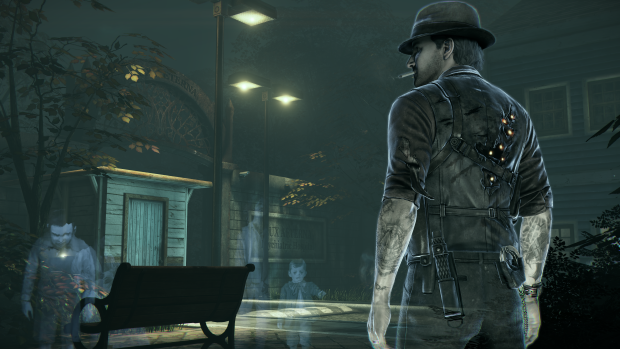
Before long, he meets Joy, a medium who can see and hear him as though he were alive, but who is reluctant to help him in case she is one day labeled as insane – and who just wants to go about her life without being accosted by the souls of the departed. While searching for the connections between the Bell Killer and Joy’s missing mother, the two form an uneasy, buddy-cop-style bond with plenty of suspicion and sarcasm thrown in.
Murdered: Soul Suspect plays out in third person, as you strike out from a central hub to various areas in and around Salem’s town centre. From a creepy apartment block to an even creepier mental asylum, from a demon-infested church to a cursed museum, Ronan’s investigation provides him a whirlwind tour of Salem’s most haunted hotspots, each with their own ghost stories unravelled by finding scattered collectibles.
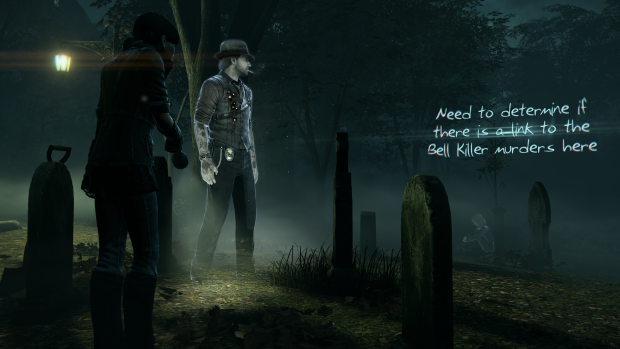
Similarly to LA Noire, the crux of the gameplay is exploration and investigation. Finding a crime scene will present you with a question that needs answering, and you’ll only find the answer by looking at everything you can possibly interact with and then sieving out the unimportant information. Also similarly to LA Noire, it’s never really that taxing, and there’s no real fail state. Most investigations are very straightforward and amount to little more than a “find the item” game, as you move around the immediate area looking for button prompts.
Certain areas of Salem that were burned during the town’s chequered history still remain as ghostly residue visible to Ronan, and a ghostly building is often more an obstacle than a real one. Airtight Games use this element – and the concept of consecrated buildings – to funnel the gameplay along a fairly linear channel. You can break away from the investigation in-between areas to explore the town and find some collectibles, but on the whole the narrative takes you where it wants you to be and there’s very little real freedom, when playing as a ghost should be more liberating than anything else.
In fact, such restrictions are what hold Soul Suspect back. For example, certain things can be affected by poltergeist activity, but aside from a segment where Ronan must distract police so that Joy can escape custody, it’s totally unused. You can stand there making vending machines fire out coke cans and photocopiers discharge stacks of paper until your heart’s content, and it has zero affect on people unless the game wants it to. Likewise, Ronan can possess the living, and then read their minds, look at what they’re holding or, if he has enough information, influence their actions.
Unfortunately, it’s incredibly limited. Reading thoughts almost always boils down to a single superfluous sentence, and not only are lines recycled through various NPCs, the voices are, too. It’s horribly jarring and completely undermines the mechanic. Perhaps the coolest thing about possession is that you can leap into cats, over whom you have complete control. You can’t go roaming, sadly, and must instead use their little bodies to locate collectibles in the immediate area, or reach high windows. As Ronan can’t enter consecrated buildings unless through an open door or window, he is occasionally forced to use a cat’s agility to gain entry at a higher point.
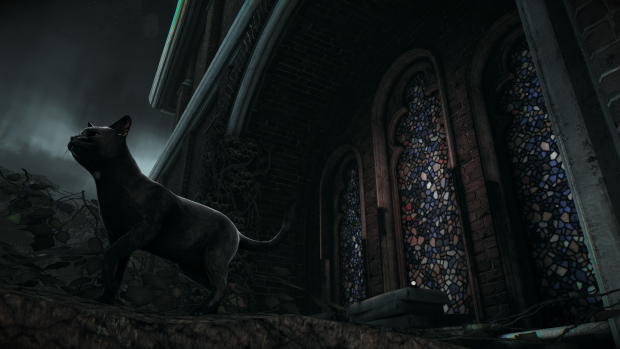
If Murdered: Soul Suspect has a primary saving grace, it’s the atmosphere. The streets of Salem are eerie, oppressive; the dark-shrouded trees of Ashland Cemetary are cloying and unsettling; the hollow halls of the Lux Aeterna mental institute ring with the wails and cries of the rabidly insane. Spectral buildings burn with ghostly fire and ectoplasmic scribblings mar many of the walls, scratched out in the apparent madness of one very creepy little girl. Shades of the dead are everywhere, often with a story to tell – although the questioning system is very basic – and some even have investigations of their own for Ronan to solve before they can move on into the afterlife.
While there is no actual combat, peril comes in the form of demons: spirits who have spent so long in Limbo that they have gone mad. They appear at scripted junctures and must be avoided or defeated, or they will eventually devour Ronan’s soul. To escape them you’ll need to hide inside pockets of ghostly residue until the demon turns its back, at which point you can sneak up behind them and execute them. The first few encounters are fairly tense, but after a while you realise that they’re easy to despatch – at which point they lose their impact almost entirely.
Ronan himself is a great character. His backstory is revealed throughout the narrative, showing his criminal beginnings and his redemption in the name of love, when he married his wife Julia and repented of his sins by joining the police force. It is revealed that his past was deliberately concealed by his brother-in-law Rex, who saw the good in him and wouldn’t allow his little sister to marry a criminal. As a result, the heavily-tattooed Ronan is a fairly complex character and certainly not your average hero.
The script is solid, if a little hokey at times, and the voice work is impressive – particularly the relationship between Ronan and Joy. But a murder mystery is only as good as the ultimate reveal, and while Murdered: Soul Suspect is interesting enough to keep you invested in the characters and their various plights, the payoff is simply not impactful enough. There aren’t enough characters to keep you guessing, and in fact the identity of the killer is fifty/fifty throughout between the only other male characters in the game. When eventually the culprit is revealed and, more importantly, the reasons for the crimes are divulged, it feels convoluted, as though the writers decided the killer at the end and retroactively altered the narrative to suit.
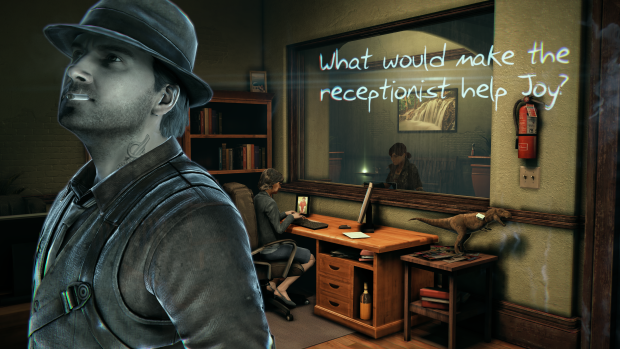
VERDICT: For all its shortcomings, Murdered remains an enjoyable romp. The lack of direct combat never becomes an issue, and the pacing of the main plot is just right. What immersion is lost through lazy NPC behaviour and limited interaction with the world is gained back by dint of the wonderfully sinister atmosphere and the likable leads. Not an instant classic but likely to do well in cult circles, Murdered: Soul Suspect is a new approach to an old genre. On the whole, there’s not enough substance to make a second playthrough viable, so the value for money is questionable, yet the mystery as it stands is well worth investigating.

GOOD. A game that scores 7/10 is worthy of note, but unworthy of fanfare. It does many things well, but only a few of them incredibly well and, despite a handful of good qualities, fresh ideas and solid mechanics, it fails to overwhelm.
Review code provided by publisher.


